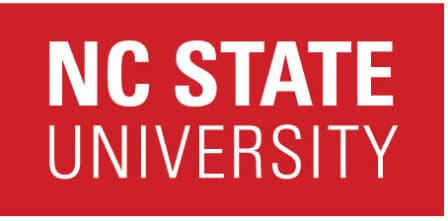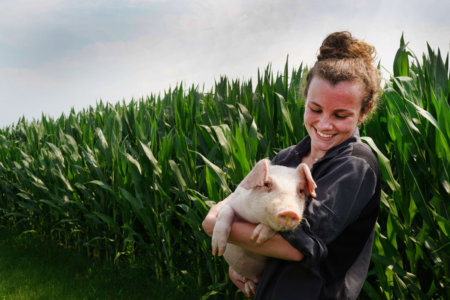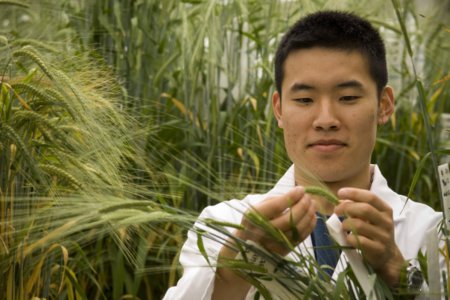The future of agriculture can broadly be described in two words: Big Data. Satellites, drones, underground sensors, and all forms of on-the-ground machinery have collected unprecedented amounts of data. Still, much more data is needed to drive better research, public policy, and decisions in the field.
Right now, few people can use this agricultural data to its maximum potential. The new and innovative Agricultural Data Science Certificate course offered through NC State University’s College of Agriculture and Life Sciences (CALS) will create graduates who can do just that — and more.
“Agriculture is a big industry that we all rely on for food; it is also highly dependent on the environment and changes in our climate,” said Daniela Jones, a CALS research assistant professor. “Our students will use data analytics to help solve data-intensive grand societal challenges such as increasing crop yields and enhancing agricultural and environmental sustainability.”
The Ag Data Science Certificate programme combines data management, analysis, computer science and statistical training. Unlike other programmes, students will train to apply these to the agricultural, food, and life sciences.
Synthesising knowledge
The Ag Data Science Certificate programme bridges a knowledge divide between the fields of data science and agriculture.
The programme brings together post-baccalaureate and graduate students with two general backgrounds:
- degrees in the agriculture, food or life sciences who want to use and manage data collected from the field; and
- degrees in computer science, math or statistics who want to apply their data science skills to agriculture or agriculture-related issues.
Students who complete the certificate programme will have a substantial competitive advantage in the agricultural workspace.
“Graduates who go on to specialise in agricultural operations will have the experience of analysing, manipulating, pooling, and applying big datasets to crops and field operations,” said Jones. “Graduates with pure data science backgrounds will enhance their skill sets for dealing with the complexities of the agricultural sector.”
From Agriculture to Data Science
Shelly Hunt, a master’s student studying biological and agricultural engineering at NC State, has an educational background in agriculture. She was one of the first students accepted into the Ag Data Science Certificate programme. She says the certificate will clearly show potential employers her area of specialisation during graduate school.
“My master’s degree will say ‘biological engineering’; that can mean a lot of things,” Hunt said. “Data science isn’t what you think of when you think of bioengineering. I can show future employers what I’ve specialised in with this. It’s easy to convey where my expertise is.”

Source: North Carolina State University: College of Agriculture and Life Sciences
Hunt directly apply statistics, data collection, and other essential aspects of data science to real-world projects in the field. For her work on NC State’s Sweetpotato Analytics for Produce Provenance and Scanning (Sweet-APPS) research project, she and a team of researchers collected data and used machine learning to understand what governs the shapes and characteristics of sweet potatoes as they grow in the field. As many misshapen sweet potatoes are never harvested, the programme helps solve food waste.
“We’re encouraged to use real-life data from hands-on research projects,” Hunt said. “It’s making me more efficient with writing code, and it’s showing me how to use new and exciting tools and technologies.”
After graduate school, Hunt plans to be an analyst for a significant ag company or a big company with an agriculture division.
From Data Science to Agriculture
Shana McDowell comes from a background in math and data science. The senior data tech at Duke University’s Human Vaccine Institute helps research the protein spikes on two of the world’s most notorious viruses: SARS-CoV-2 and HIV.
At the end of August, she will leave her job at Duke to get her PhD degree in biological and agricultural engineering at NC State. As part of her studies, she enrolled in the Ag Data Science Certificate programme.
“I didn’t realise there was a lane for data scientists in agriculture,” McDowell said. “But I like to work with data and make sense of it, and I always loved working in new and different disciplines.”
Like Hunt, McDowell will be working on the Sweet-APPS project, using math and her computational science backgrounds to solve a real-world issue in agriculture.
Jones says the Ag Data Science Certificate programme will build a close community of experts, like McDowell and Hunt. They can use analytics to help solve some of the grandest issues in the agricultural and plant science fields today.
“This certificate programme is well-positioned for NC State,” said Jones. “A lot of our instructors are also researchers working to solve some of the biggest issues facing the world today through the N.C. Plant Science Initiative. These students will have the opportunity to take on food insecurity, sustainable agriculture, and climate change.”
A quantifiable demand
NC State surveyed 254 individuals working in a broad range of agriculture and life science companies. Of the 41% who responded:
- 87%said that one or more employees in their company would like to get additional training in agriculture data science management.
- 93%indicated that one or more future positions in their company would require or benefit from agricultural data science management training.
- 71%thought that the need for people with training in agricultural data management would increase substantially over the next five to 10 years.
Additionally, Insider Intelligence predicts nearly 12 million agricultural sensors will be installed globally by 2023. They will likely be found in plant and soil sensors and drones to obtain detailed maps of field topography and variables such as acidity and soil temperature, climate forecasts and weather patterns — all of which are accessible in the cabs of their farm equipment, or their tablets and smartphones.


Ag data collection and analytics can help farmers remotely monitor their equipment, crops and animals, obtain data and even run statistical predictions for their crops and livestock while tracking food movement to ensure the safety of the food supply.
There are tremendous growth opportunities in agriculture for the integration of data science and data analytics. A recent report from Markets and Markets estimates the global agriculture analytics market could grow from $800 million in 2020 to US$1.4 billion by 2025.
Help bridge agriculture’s data gap with NC State’s Ag Data Science Certificate Programme. Learn more.













